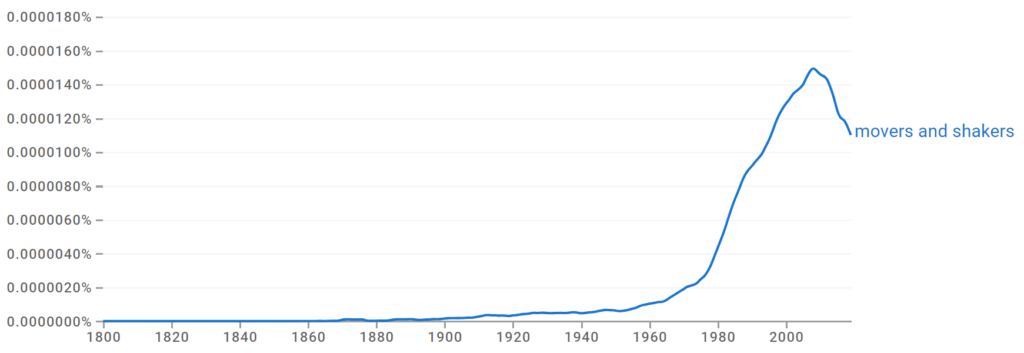The idiom movers and shakers refers to influential and powerful people who drive change and innovation in the world. If you’re unfamiliar with this phrase, it probably sounds like a simple description of motion. However, in reality, it carries a much deeper and specific meaning.
Idioms such as movers and shakers are phrases that don’t have literal meanings within the combination of words used. They are essential to the English language because they can bridge gaps in communication while also holding onto a history of use.
In this article, I’ll cover the idiom’s meaning, origin, examples of use, and synonyms. By the time you finish reading, you’ll be a pro at using this phrase! So, continue reading and enhance your idiomatic knowledge!

What Does Movers and Shakers Really Mean?
Movers and shakers are certain people or groups with the power, influence, and energy to bring about change and make things happen. Merriam-Webster defines it as “a person who is active or influential in some field of endeavor.” They are the driving force behind innovation and progress in different fields, like business, politics, arts, or any other domain.
It captures others’ ability to make change and highlights their dynamic and proactive personalities. Take people like Elon Musk, Jeff Bezos, Taylor Swift, J.K. Rowling, etc. These are all household names today because of the moving and shaking they’ve done in their worlds. Taylor Swift alone encouraged over a million people to become first-time voters!
What Are the Literal and Figurative Meanings of the Idiom?
The literal meaning of the phrase movers and shakers is quite straightforward. Movers refer to people or things that physically move or transport objects, while shakers refer to people or things that shake or agitate. In a literal sense, it can be associated with individuals who are involved in activities like moving furniture or shaking objects.
Its figurative meaning encompasses a sense of power, initiative, and influence, portraying people who just aren’t afraid to shake up the status quo to bring about progress. Because when you hold that level of power, it’s your duty to speak for the little guy or push for much-needed changes.
Are There Variations of This Idiom?
There are no common variations or regional differences of movers and shakers. It’s British English in origin, and when the phrase migrated to America during the sixties, it upheld its original form. But we can’t ignore the different forms. Movers and shakers are what you’d call certain people, but when describing the action, you could say moving and shaking.
How Is the Idiom Used, and What Are Some Examples?
Movers and shakers is a phrase that remains relevant and powerful even in common usage. It perfectly captures the whole idea of influence and dynamism in different modern contexts. Here are a few examples of how you can use it:
What Are Different Ways of Using the Idiom in Context?
- In the business world: The CEO of the tech start-up has proven to be a real mover and shaker in the industry, changing the landscape as we know it.
- In politics: Abby is considered one of the biggest movers and shakers in the current political world, and you’d be lucky to have her on your side.
- Arts and culture: The author’s out-of-box approach has made him one of the movers and shakers in the publishing industry.
Are There Notable Examples of the Idiom in Movies, Books, or Media?
Movers and shakers has notable mentions in journalistic writing, interviews, and literature to describe influential individuals. It’s also used as the title for several movies and books, such as “Movers and Shakers,” directed by William Asher. The 1985 film depicts a tale of a Hollywood director trying to make a movie come to life for his dying friend.
How Is the Idiom Commonly Misinterpreted or Misused?
Some might misinterpret movers and shakers as referring to people who are physically active or energetic, missing the idiom’s emphasis on influence and ability to initiate change.
I have a friend who teaches middle school, and she uses the term movers and shakers when talking about the kids who can’t sit still or pay attention. Here, she’s using it more literally than its figurative intent.
What Is the Origin of the Idiom Movers and Shakers?

The expression movers and shakers was coined by Arthur O’Shaughnessy in his 1874 poem, Ode, hailing the work of musicians and poets: “Yet we are the movers and shakers / Of the world for ever, it seems.”
This poem was adapted into a choral presentation in 1912. However, the expression movers and shakers didn’t become popular until the 1960s in the United States to describe influential or powerful people.
How Has the Idiom Evolved?
In its original context, it referred to individuals who had the power to change the world, especially artists and thinkers. Over time, the term started to be used more broadly to refer to powerful people who initiate change or influence events in any area, such as politics, business, entertainment, etc.
This shift reflects social changes and the increasing importance placed on roles other than those traditionally considered as power positions in society. Today, movers and shakers can refer to influential individuals in any sector or environment, showing the adaptability and evolution of idiomatic expressions in line with cultural and societal shifts.
What Are the Related Terms to this Idiom?
When we know the synonyms and opposites of certain words and phrases, we can create a bigger picture for ourselves and really nail our usage of idioms like this one.

What Are Some Synonyms?
- Power brokers
- Influencers
- Trailblazers
- Trendsetters
- Power players
- Game changers
- Key players
- Pioneers
- Titans
- Heavy hitters
What Are Related Terms and Phrases?
- Agents of change
- Innovators
- Influence
- Power
- Leadership
- Change
- Progress
- Decision-making
What Are Some Antonyms?
- Gainers and losers
- Small fry
- Nonentities
- Nobodies
- Unimportant persons
- Underdogs
- Followers
- Passive players
- Benchwarmers
- Wallflowers
- Rank and file
Keep Moving and Shaking
The idiom movers and shakers encapsulates the dynamic nature of language, symbolizing influential individuals who shape the world. Deeply rooted in English, idioms like this bridge communication gaps while preserving a rich history.
Having explored its meaning, origin, usage, and synonyms, you are now well-equipped to employ this phrase effectively. Your journey into the vibrant world of English idioms continues, enriching your expressive capabilities. Be sure to check out hundreds more idiom guides like this one on our site.
Here are some idioms we have covered:
